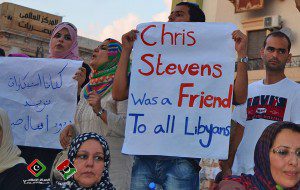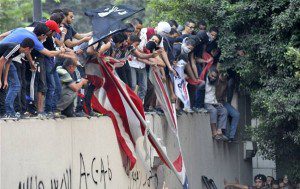By Ahmed Younis
When you burn the American flag you burn my flesh. When you speak ill of the Prophets of God, you stab me in the eye.
Understanding with any clarity what happened in Cairo and Benghazi on Tuesday will take some time as we gather facts and move past the emotion of our reactions. Some facts seem to be clear.
Violence and Death in Benghazi
In Benghazi, news reports indicate a premeditated attack on the consulate with speculation that the protests were used as a decoy for the attack. Evidence of links to Al Qaeda elements in Libya were offered by former Libyan extremist Noman Benotman of the Quilliam Foundation of the United Kingdom, as well as by leaders in U.S. government intelligence circles.
In the explosive attacks, done with sophisticated weaponry that caused a fire from which the martyrs were not able to escape, U.S. Ambassador Chris Stevens (champion supporter of the Libyan revolution against the dictator Col. Qaddafi) , and three others were killed. And so they gave their lives, with great honor in service of our nation.
 In the final standoff to secure the U.S. embassy in Tripoli, U.S. Marines and Libyan security forces cooperated to control the situation. Since then, Libya’s interim president issued a strong condemnation, and peaceful marches of condolence to the American people by Libyan citizens (holding signs of apology, love for Stevens, and that this is not what Islam teaches) were reported throughout U.S. media outlets. Ambassador Stevens was instrumental in leading the American effort to support the overthrow of the Qaddafi regime and the subsequent effort to support Libya’s efforts at securing positive and lasting effects of their revolution. From all accounts, Stevens believed in the Libyan people and shared their vision for a Libya free of dictatorship.
In the final standoff to secure the U.S. embassy in Tripoli, U.S. Marines and Libyan security forces cooperated to control the situation. Since then, Libya’s interim president issued a strong condemnation, and peaceful marches of condolence to the American people by Libyan citizens (holding signs of apology, love for Stevens, and that this is not what Islam teaches) were reported throughout U.S. media outlets. Ambassador Stevens was instrumental in leading the American effort to support the overthrow of the Qaddafi regime and the subsequent effort to support Libya’s efforts at securing positive and lasting effects of their revolution. From all accounts, Stevens believed in the Libyan people and shared their vision for a Libya free of dictatorship.
This attack and murders, of course, comes on the heels of a coordinated demolition of shrines built to commemorate the life of significant Muslim scholars and sages in history. This effort pursuant to a Salafi anti-Sufi impetus was seen by many as a turning point in the efforts of post-revolutionary leaders to stem the fast-paced change on the landscape of the Libyan spectrum of Islamic opinion. Surely, many are connecting this most significant escalation with the inability of the central government to control the safety of citizens and guide the reconciliation of varying factions of thought throughout the country.
We do not know whether there is a connection between the perpetrators of these acts and the terrible violence at the U.S. Embassy in Benghazi on Tuesday. Both attacks do, however, share the belief that change can come with the destruction of property and the killing of innocent people. Certainly these people are not moderates and do not represent the vast majority of Libyans.
Violence in Cairo – Is There a Connection?
What has happened, however, in Cairo, Egypt seems very different. Upon the provocation of the release of a film, created by a self-described “American Israeli” millionaire from my home state of California (who may in fact be someone else entirely) and the more recently released translation of the film into street slang Egyptian Arabic for mass consumption, hundreds of people poured into the streets surrounding the U.S. Embassy in Cairo to protest what was clearly an incitement to offend.
 Their protests, which many in Egypt recognize to have been instigated by Salafi groups and supported by other elements of the Islamist political spectrum, ended up at the U.S. Embassy. To anyone that has visited the U.S. Embassy in Cairo the next part is the most fascinating and confusing. The mob (as described in western news outlets) managed to traverse the significant police presence in all the emptied streets around the embassy and reach its walls to burn the American flag. Meanwhile, from CNN reports on the ground, it was apparent that the police first chose not to intervene in the protests and allowed the energy of the crowd to dissipate on its own.
Their protests, which many in Egypt recognize to have been instigated by Salafi groups and supported by other elements of the Islamist political spectrum, ended up at the U.S. Embassy. To anyone that has visited the U.S. Embassy in Cairo the next part is the most fascinating and confusing. The mob (as described in western news outlets) managed to traverse the significant police presence in all the emptied streets around the embassy and reach its walls to burn the American flag. Meanwhile, from CNN reports on the ground, it was apparent that the police first chose not to intervene in the protests and allowed the energy of the crowd to dissipate on its own.
As the protests continued through the night, the participants changed and the “Ultra” gangs of Egyptian youth affiliated with soccer clubs came out to continue their long lasting war with the Egyptian domestic security apparatus. This ongoing tension between the Ultras and security forces has led to a regression in the development of the Egyptian revolution and has taken a portion of Egyptian public life right back to pre-Mubarak era of domestic violence.
Soon after the protests at the embassy in Cairo, the Muslim Brotherhood, the strongest political force in Egyptian politics today and the former political party of the current President of Egypt, called for protests against the film following Friday congregational prayers this week.
How Do We Deal and Move Forward?
These two significant historical moments are hard to digest for anyone studying the news or talking with friends about these events. We all come to these scenarios from our own life experiences and with all of the information we gather in life to learn to cope with such situation.
Since I was a young man of 15, I’ve been deeply engaged in the situation of Muslim Americans sociologically. The beautiful colors of identity and faith that make up the most diverse religious group of America serves as the core of my personal identity. As an American of Egyptian heritage who chooses Islam as a faith, I once again find myself with a bleeding blind eye and singed flesh on my bones.
I’ve come to find great sadness, not comfort, when resorting to scripture to ameliorate my aches and intellectual dissonance. I have recited so much the Quranic verses about how the killing of an innocent life is like the killing of all of humanity and how it is impermissible to use tactics that are forbidden by Islam to defend the honor of God and his Prophets, that these verses are committed to memory.
I think of the Prophet Muhammad worrying about the absence of trash and filth at his doorstep because it indicated the woman abusing him might be sick and in need of support. The same Prophet that forbade any violent reaction by esteemed companions when a man urinated inside his mosque in his presence to offend him.
For a movie that no one would have otherwise seen, people who claim to follow this Prophet desecrated the honor of a whole nation and tarnished the greatness of our faith. Surely I am not surprised that people who claim to follow a faith can let their banal human emotive reactions to instigation sway them toward injustice. I just hoped my people, having read those specific words in the Quran, would not be among them. This wasn’t the case.
What frustrates me the most is the confusion I see on all ends. On one side our government needs to be clear with our friends in the rich countries of the region that we will no longer allow the pumping of a non-organic Salafi presence in these countries.
Among Muslims, I still see a significant amount of heads in the western sand claiming, ‘This is not my problem.” No, habibi, this is your problem. And as the follower of a Prophet that was told by God in the Quran that he was only sent to be a mercy to mankind, you’ve got a great deal of work to do. And, we can do it together.
We can start by telling Muslims in the Arab world and globally that this film was a hoax. That the actors in the film had no idea they were engaging in a project that desecrates the Prophet and offends Muslims. One actress in the film said there was nothing in the script about Islam or the Prophet at all. We need to care about and engage this, not just because we are Americans whose Ambassador has been killed, but because we are Muslims whose Prophet has been defamed.
For political analysts, it is time to discuss our friendships in the Middle East, focus on who is financing the Salafi sweep, and deal with their amplified presence in post-revolutionary Libya, Egypt and Tunisia. There need to be some serious conversations with allies about who they are funding and what controls they have in place to ensure that such funding is never used against the organic revolutionary interests of the people of those nations.
What happened Monday threw the interests of the citizens who overthrew dictators to the wayside and derailed the road to progress and prosperity.
Finally, it is important to respond to the emotional outburst of Muslims when Islam is desecrated. Terry Jones cannot burn the Quran. It is unburnable. It sits in our minds memorized, in our hearts internalized and is protected by the Almighty — just as all of God’s miracles have been protected. And, there isn’t a man on earth who can burn our flag. It is unburnable.
But while it is not fair to ask for those who love a man — a Prophet — to not be hurt when his honor is desecrated, it is fair to ask and expect those followers to respond as their Prophet would in the same situation.
Let us all pray that the intended revolutions of the Arab world reach stability and success and pray that those in power in transitional periods gain wisdom and divest from the ego, not the will of the masses. And we pray for grace and mercy for the martyrs that passed and ask God to bring them into his abode in Paradise. Amen.
Ahmed Younis is an American public intellectual, social entrepreneur and orator. In 2009, 2010, and 2011, Ahmed was named as one of the 500 Most Influential Muslims globally by the Royal Islamic Strategic Studies Centre, Jordan. In 2011 and 2012, Arabian Business Magazine named Ahmed as one of the “Power 500” of the Arab world and one of the 500 Most Famous Arabs in the world.
Photos courtesy of Associated Press and Reuters.












